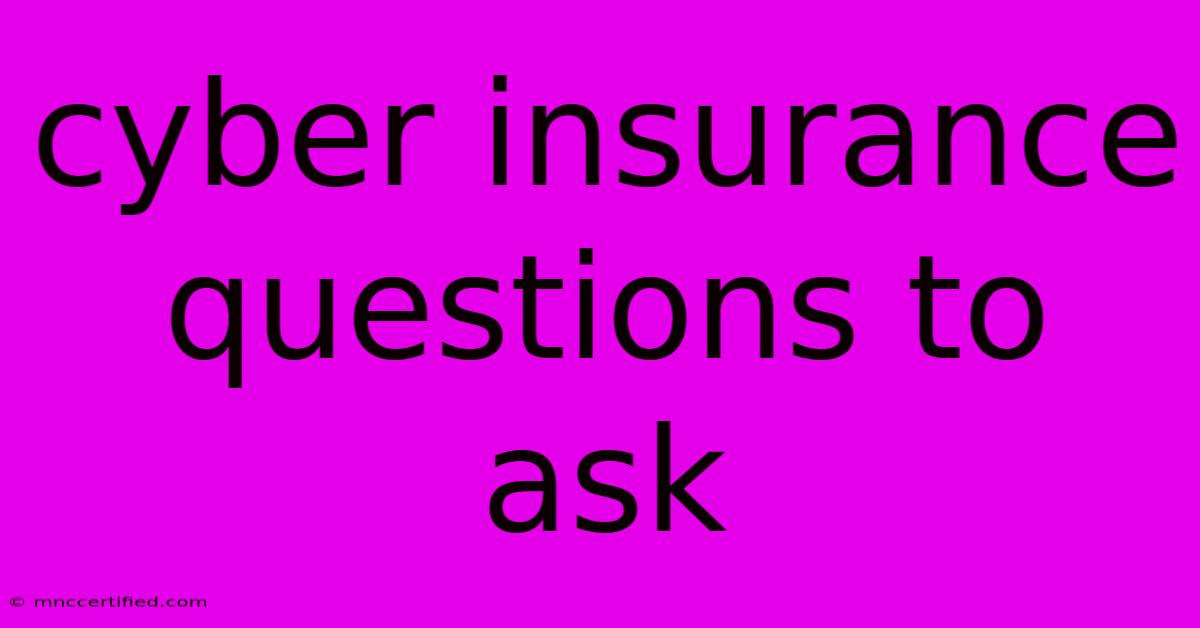Cyber Insurance Questions To Ask

Table of Contents
Cyber Insurance Questions to Ask: Protecting Your Business in the Digital Age
The digital landscape is a minefield of potential threats. From ransomware attacks to data breaches, the cost of a cyber incident can cripple even the most successful businesses. That's why cyber insurance is no longer a luxury—it's a necessity. But choosing the right policy requires careful consideration. This article will equip you with the essential questions to ask when evaluating cyber insurance options, ensuring you get the coverage you need.
Understanding Your Needs: The Foundation of Choosing the Right Policy
Before you even start contacting insurers, take stock of your business's unique vulnerabilities. Ask yourself:
- What kind of data do you store? Personally Identifiable Information (PII), financial data, and intellectual property all carry different levels of risk and require varying levels of coverage.
- What are your biggest cybersecurity risks? Are you a target for phishing attacks? Do you rely heavily on third-party vendors? Identifying your weaknesses will help you focus on policies that address those specific threats.
- What's your recovery plan? How long would it take to restore your systems and data after an attack? This will influence the level of business interruption insurance you require.
- What's your budget? Cyber insurance premiums vary significantly. Determine a realistic budget before you start shopping around.
Key Questions to Ask Your Cyber Insurance Provider
Once you understand your needs, it's time to start asking potential providers some crucial questions:
Coverage and Limits
- What types of cyberattacks are covered? Ensure the policy covers ransomware, phishing, denial-of-service attacks, and other relevant threats. Specifically ask about ransomware coverage as this is increasingly common.
- What are the policy limits? This refers to the maximum amount the insurer will pay out for a covered event. Make sure the limit is sufficient to cover your potential losses, including data recovery, legal fees, and business interruption costs.
- Does the policy cover first-party and third-party losses? First-party losses are your direct costs (e.g., data recovery), while third-party losses are costs related to damages you cause to others (e.g., legal fees from a data breach). You need coverage for both.
- What about regulatory fines and penalties? Data breaches can lead to hefty fines from regulatory bodies like the GDPR. Make sure your policy adequately covers these potential costs.
- Is there coverage for crisis management and public relations? Managing the reputation damage after a cyberattack is crucial. Inquire about coverage for public relations support and crisis management services.
Exclusions and Limitations
- Are there any specific exclusions? Carefully review the policy's exclusions to understand what's not covered. Pay close attention to clauses related to pre-existing conditions, employee negligence, and social engineering attacks.
- What are the notification requirements? Understand the process for reporting an incident and the timelines involved. Prompt reporting is critical to minimizing losses.
- What are the deductible and co-insurance requirements? This will determine your out-of-pocket expenses in the event of a claim.
Claims Process and Support
- What is the claims process like? Understand the steps involved in filing a claim and the support you can expect from the insurer.
- Do you offer 24/7 support? Cyberattacks can happen at any time. Ensure your provider offers around-the-clock support to help you respond quickly and effectively.
- What resources do you provide for cybersecurity awareness training and incident response? Many providers offer valuable resources to help prevent future attacks.
Beyond the Basics: Thinking Ahead
- How will the policy renew? Will premiums increase? Will coverage change?
- Does the policy cover losses due to human error? Many cyber incidents are caused by simple human mistakes. Make sure your policy addresses this.
- Can you provide references from other businesses similar to mine? This helps you gauge the insurer's experience with businesses in your industry.
By asking these thorough questions, you can ensure that you choose a cyber insurance policy that provides comprehensive protection for your business in today's increasingly digital world. Remember, the cost of not having adequate coverage can far outweigh the cost of the premium itself. Invest in your security; invest in cyber insurance.

Thank you for visiting our website wich cover about Cyber Insurance Questions To Ask. We hope the information provided has been useful to you. Feel free to contact us if you have any questions or need further assistance. See you next time and dont miss to bookmark.
Featured Posts
-
Baldurs Gate 3 Crashing On Xbox
Nov 21, 2024
-
Laos Methanol Four Dead Tourists Included
Nov 21, 2024
-
Lapse In Home Insurance Coverage
Nov 21, 2024
-
33 72 An Hour Is How Much A Year
Nov 21, 2024
-
Nvda Stock Tomorrows Price Prediction
Nov 21, 2024